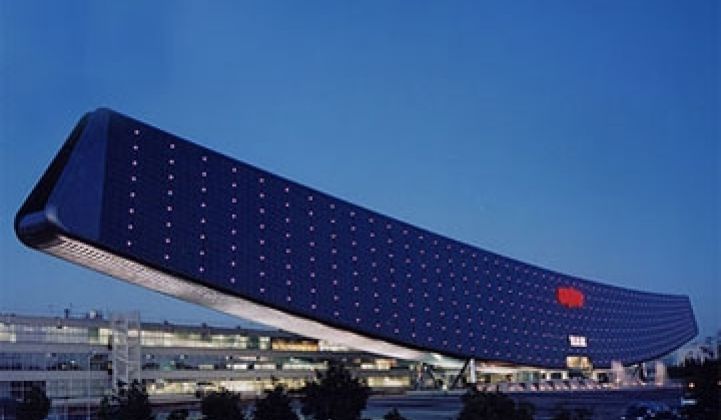To remain among the top three suppliers of solar-panel solutions tied to 'smart energy' systems, Sanyo is betting on delivering better R&D, and working with the Ivory Tower.
The University of California, San Diego (UCSD) and Sanyo North America jointly announced an agreement to collaborate on the University's energy-storage project. The two entities revealed details of a multi-year, multi-disciplinary agreement in renewable energy. The research will build on Sanyo's 'Smart Energy System' and ongoing work at UCSD's Jacobs School of Engineering in areas such as solar forecasting, energy-storage research, development and education.
The Smart Energy System exemplifies local power generation for local consumption (solar panels generate energy that is stored in local rechargeable batteries and then used in local energy-efficient appliances).
In the midst of the current economic crisis, many Japanese solar firms are trying to latch onto energy as the next big export. Sharp, Kyocera, Kawasaki, Toshiba and Mitsubishi Electric, among others, are investing billions of dollars to expand production of batteries, fuel cells, "green" TVs, and solar cells over the coming years. Many are also participating with Los Alamos National Labs in smart grid trials in New Mexico. Panasonic bought a controlling interest in Sanyo in 2009. (Historical note: Sanyo was started decades ago by an early Panasonic employee.)
The Smart Energy System has been incorporated throughout Sanyo's Kasai HEV Battery Factory at Japan for optimum energy usage. The factory is scheduled to start operation in summer 2010.
Looking for clouds
"This partnership with Sanyo will further leverage the university's energy-research expertise which, in turn, will benefit industry, society and the environment," said Chancellor Mary Anne Fox.
Why UCSD? "Because we've done previous research with them; Sanyo's America headquarters are located in this city. And UCSD ranks ninth and fourth in high-quality engineering in the world and in the U.S., respectively," said Aaron Fowles, Sanyo North America spokesman.
Public-private partnerships play a huge role in alternative energy. BP gave $500 million to the University of California and the University of Illinois for biofuel research, while Dow Chemical jointly researches solar technologies with Caltech.
Sanyo gets a substantial portion of its revenue from solar, but has been facing challenges from low cost manufacturers in China and Taiwan. Like SunPower, Sanyo is known mostly for its high-end, high-efficiency cells and modules.
Research will build on the Sanyo Smart Energy System concept, designed to improve the stability and reliability of renewable energy, as well as on ongoing work at the Jacobs School of Engineering in areas such as solar forecasting, energy storage and general energy management. Targets for research projects include developing the next generation of energy solutions, focusing on minimizing emissions while offering stable, reliable renewable energy generation, storage and efficiency from small- to large-scale systems.
For example, UCSD has being working on the Total Sky Imager (TSI), which provides continuous digitization of the sky and computes cloud amounts for each image. "This is crucial to know when it is useful to store energy," Fowles emphasized.
Sanyo and UCSD will explore various ways to combine technology through joint research, and together will create an Energy Development Open (EDO) Platform to propose a number of application services using Smart Energy Systems. Through promulgating an open platform, application services that can optimize energy use are anticipated, and by expanding on a global scale, they can contribute beneficially to the earth's environment.
The first step of the agreement with UCSD is that two students will work as interns on the Sanyo Smart Energy System at the company's Osaka, Japan headquarters. The students will research solar forecasting, adaptive-charging technologies, and customer optimization of variable battery and photovoltaic technologies.
Sanyo is the world's leading supplier of rechargeable battery products. The solar industry cannot rely on solar panels alone. Sanyo thinks that a stable electrical grid must include batteries. That is the bet that the Japanese company is making.



